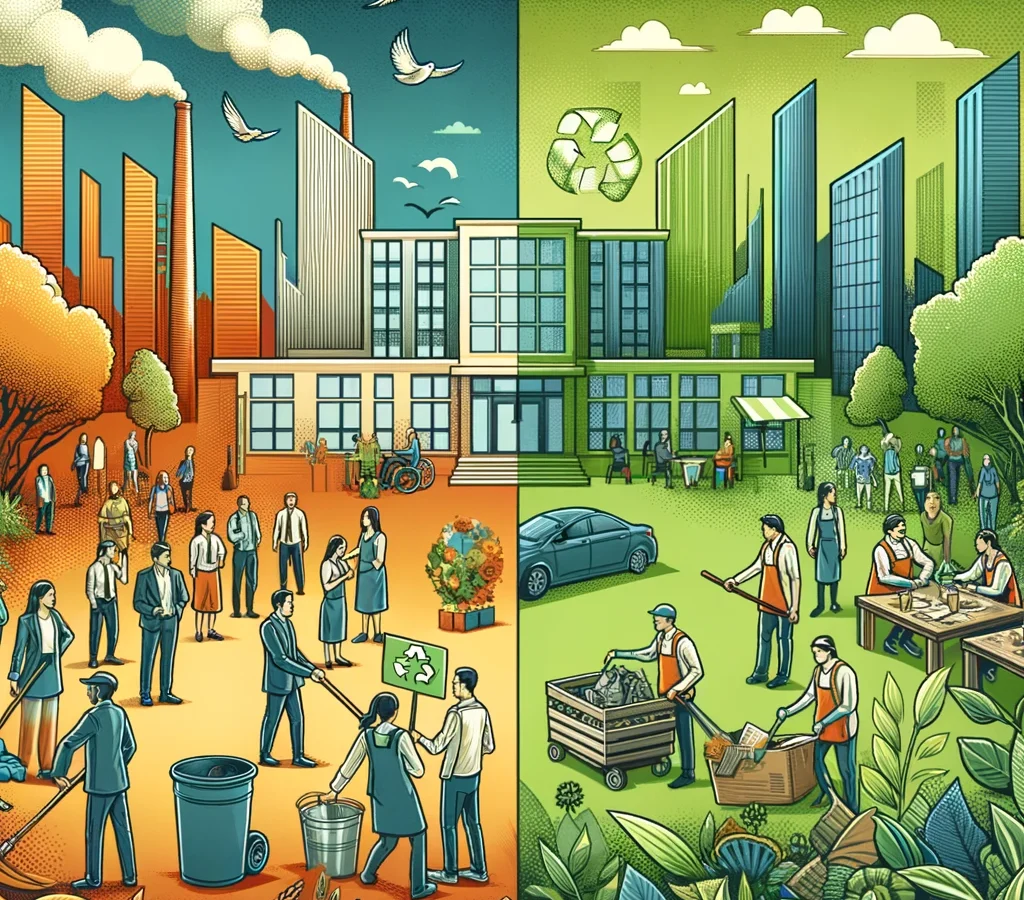Implementing business strategies with a focus on social responsibility is not just ethical but also beneficial for long-term success. Customers increasingly expect companies to act responsibly, making it essential for businesses to align their operations with societal and environmental values.
Not only are your customers expecting it, but it feels right too. But why?
The reason is simple: by nature, we are all energetically connected. We are interdependent beings — connected through the innate quality of service. The ecosystem of life is weaved together through this same quality, as every herb, plant, animal, and human has been perfectly designed to perform a particular function for the benefit of this ecosystem.
Every living entity contributes uniquely to the ecosystem, underscoring the importance of respecting all forms of life. Recognizing this interconnectedness is crucial for fostering a socially responsible mindset in both personal and business practices.
Every living thing has a purpose and deserves respect.
It is this understanding of connectedness that sheds light on our thirst for social responsibility. In other words, it is not smoke and mirrors, it is essential to life and liberty.
Of course, like anything, even something as noble as social responsibility can be misused for selfish motivations. But like sugar, although it can cause our body harm in large quantities, its essential function is to stimulate pleasure in the palate and evoke feelings of happiness and satiation.
True social responsibility involves comprehensive consideration of personal and business choices, ensuring they align with ethical standards and contribute positively to society and the environment.
Is it enough to buy carbon credits? Is it enough to recycle? Is it enough to have a good DEI (Diversity Equity Inclusion) score for our company?
No, no, and hell no!
To be socially responsible as an individual and as a company means, taking into consideration all aspects of our personal life choices and our business practices, from the way we dress, eat, and drink, to how our companies purchase supplies, power our business, package our products, and most importantly, how we give back to the community.
There has been plenty said about how we should do all of these things, but one critical overruling perspective should guide each decision we make in performing these tasks as an individual and as a company. Ask this question:
Am I respecting the life of another living thing and doing the least amount of harm with this decision?
Once you can get an honest answer to that simple question, you can enthusiastically go forward with a socially responsible mindset.
Everything else about that function or business decision then becomes rudimentary, because the guiding principle of your actions has been clearly established.
For example, say I am about to choose my dinner from a menu. I see a bunch of delicious-looking creations that catch my eye, some of them have meat and fish, while some of them have vegan options with a protein replacement, like tofu or mock meat. The socially responsible thing to do for our body and the planet is to choose the vegan option, simply because it is the choice that will cause the least amount of suffering to another living thing and the best choice for the planet.
Sadly, many people, either through ignorance or cognitive dissonance, still do not want to accept the fact that animal agriculture is the biggest polluter of the environment. It is the height of hypocrisy to see climate change proponents and eco-activists eating meat and dairy.
Similarly, your company may be all in on recycling and even be powered with solar panels, but if you are not consistent across the board, your efforts will always fall short of the mark. We can’t tout our company as eco-friendly while also scoffing down burgers for lunch paid for with company dollars while sitting on our leather chairs.
We may think we have the solution by “offsetting” our bad behavior by purchasing carbon credits (probably the biggest scam in modern history), when in fact, we are just trying to distract attention away from our bad business practices with a soul-less line item on a tax return.
True social responsibility requires consistency in actions and words, ensuring that every decision reflects a commitment to ethical and sustainable practices. This holistic approach benefits both society and the environment.
It is not easy, but we can make baby steps toward this ideal, one day at a time.
To be fair, I understand the challenges of transitioning to a plant-based diet. Although, it is much easier in 2024 than it was when I started in 1980. On top of that, no two people have the same biological makeup or circumstances, so diet is a very personal matter. However, we have to remember that while a company is legally considered an individual, it is ultimately operated by the consciousness of a board of directors. A company cannot decide by itself how it functions. It is not a living thing like we are. So while the IRS treats it like a person, it is the people who run the company that have the responsibility to do the right thing on behalf of the company.
As responsible stewards of our company, we need to make decisions that are best for that impersonal entity we treasure as our “company.”
For this reason, while our personal lives may be in conflict with the ideals of our company, we have a fiduciary and social responsibility to manage our company so that it operates in the best way possible, meeting the expectations of our customers.
It has been noted that the customer demographic that is pushing hardest on corporate social responsibility are the Millennials and Gen Z. According to the latest research, 94% of Millennials and Gen Zs would buy from a company with an excellent CSR program. 84% of them would give socially responsible companies the benefit of the doubt in the event of a crisis, and 73% would pay extra for sustainable products.
Millennials and Gen Z are generations that place huge importance on making an impact and being able to see that impact through direct cause and effect. These new generations associate their jobs with more than a paycheck — they see a job as an integrated part of their lives that should be as meaningful as what they do outside of work.
When it comes to giving back responsibly, the choices can sometimes be overwhelming. Platforms like Benevity, and The Giving Block cater to and support thousands of non-profit partners with their technology. It is not easy knowing where to direct your giving dollars.
One charity that does tick all the boxes is Food Yoga International, formerly known as Food for Life Global. The non-profit has a long history that dates back to the mid-70s. Through its various incarnations as a charity, it has evolved into a world leader when it comes to socially responsible humanitarianism. Food Yoga International oversees an international network of plant-based food relief projects that serve over 1 million meals daily in 65 countries. Their food philosophy is called food yoga. The word yoga is a Sanskrit word that means to “unite,” so the charity’s tagline and mission is to “Unite the world with pure food,” clearly separating itself from other food relief charities in the industry with its innovative approach to solving world hunger.
However, more importantly, since the charity only serves plant-based meals, it is also making a statement about its respect for planet Earth. Again, it is an established fact that animal agriculture causes more environmental damage than all the planes, trucks, and cars of the world combined.

Keeping with its mission to unite the world with pure food and respect all life, Food Yoga International has also embraced the important role that animal sanctuaries play in educating the youth on the value of a vegan lifestyle. One of its primary affiliates is Juliana’s Animal Sanctuary, located in Colombia, South America.
The mission of this charity is to teach equality of all life and the primary way they do this is by showing the children from visiting schools that animals are also sentient beings, with intelligence, emotions, and feelings.

Food Yoga International is a socially responsible charity worth supporting.
To learn more about Food Yoga International, formerly known as Food for Life Global, visit www.ffl.org or follow us on Twitter @fflglobal
Download the Food Yoga International Corporate Sponsorship deck here
FAQ
Q: What does it mean to be socially responsible?
A: Social responsibility involves making decisions that benefit society and the environment. For individuals, this means adopting sustainable habits. For companies, it includes ethical business practices and community engagement.
Q: How can companies implement social responsibility?
A: Companies can implement social responsibility by adopting sustainable practices, ensuring ethical supply chains, engaging in community initiatives, and reducing their environmental footprint. Transparency and accountability are key.
Q: Why is social responsibility important for businesses?
A: Social responsibility enhances a company’s reputation, meets consumer expectations, and contributes to long-term success. It fosters trust, loyalty, and can lead to financial benefits through sustainable practices.
Q: What are the key elements of social responsibility in business?
A: Key elements include ethical business practices, sustainable operations, community engagement, and transparency. Businesses should strive to minimize environmental impact and contribute positively to society, aligning their goals with broader societal values.
Q: How can individuals practice social responsibility?
A: Individuals can practice social responsibility by adopting sustainable habits, such as reducing waste, supporting ethical brands, and engaging in community service. Personal decisions should reflect a commitment to societal and environmental well-being.
Q: Why is social responsibility increasingly important for companies?
A: Social responsibility is crucial as consumers and stakeholders demand ethical practices. It enhances a company’s reputation, fosters trust, and can lead to financial benefits. Companies that prioritize social responsibility are better positioned for long-term success.


Leave a Reply
You must be logged in to post a comment.